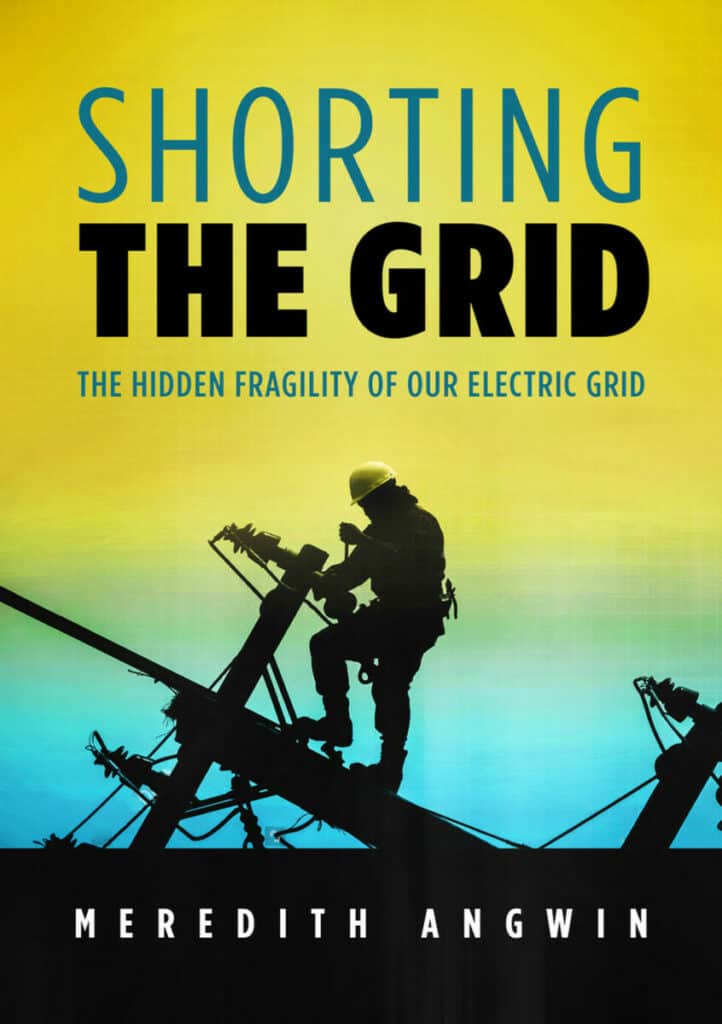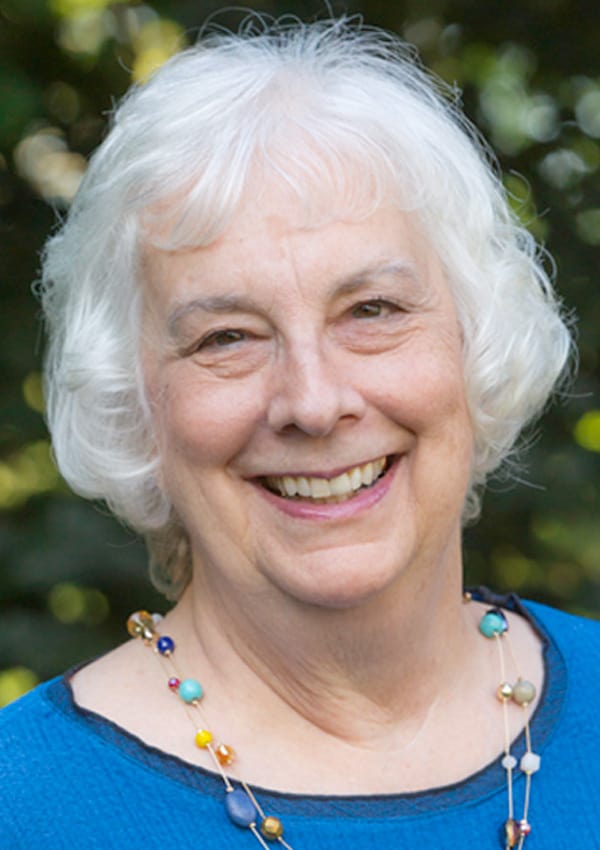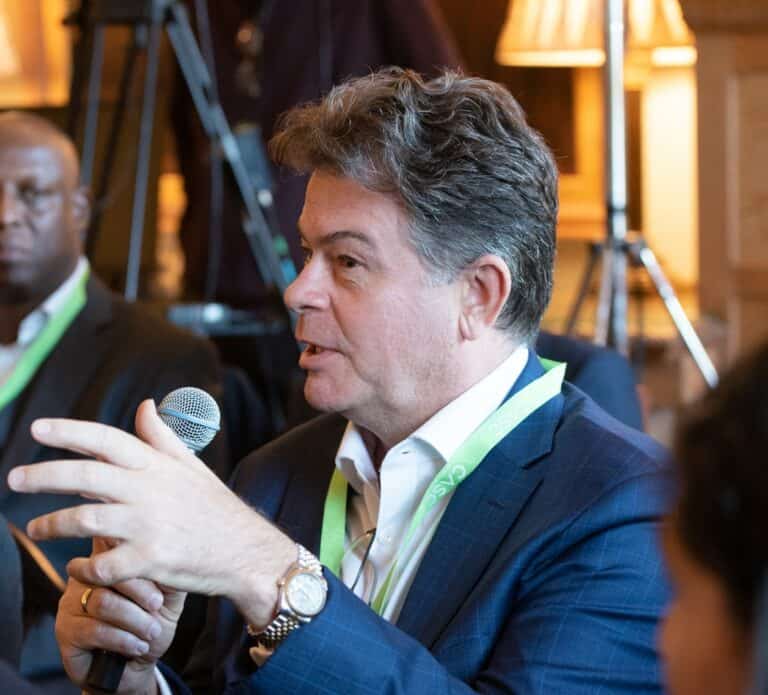Atomic Show #284 – Meredith Angwin, Author of Shorting the Grid: The Hidden Fragility of Our Electric Grid

Meredith Angwin has become an authority on the arcane topic of governing electric grids in the United States. She’s concerned and thinks others will may share her concern when they recognize there is a key missing element in grid governance.
There is no organization or individual that is responsible for making sure that electricity is generated, transmitted and delivered to customers.
Various organizations, often with competing or conflicting interests, have shared responsibility for different parts of the system that includes generators, transformers, switchyards, transmission lines, distribution lines and billing systems, but “the market” has been assigned the responsibility of supplying wholesale electricity.
And that market is not the free market, but instead is a hybrid that is governed by an ever changing stack of layered rules where many of the important decisions are made by participant groups that do not include customers or even enabled representatives of customers.
A growing portion of the grid’s electricity is dependent on free, but uncontrolled natural flows. Another portion comes from generators whose fuel is delivered by capacity-limited pipes in a “just in time fashion.” When the natural flows are interrupted or something interferes in the pipelines’s capability to deliver fuel, generators stop producing power.
There are processes that can be called into action, but costs can skyrocket in times of scarcity. Some market players thrive in times of crisis and have few incentives to ensure those crises never arise.
Meredith has produced an accessible, clearly written book that reveals important aspects of a complex topic. It deserves to be on the reading list for people who are interested in electricity.
It belongs in the library of every congressional and senatorial office. At least one person in each staff should be assigned the task of reading it and preparing a report for their member.
Governors and state level legislators might want incorporate lessons revealed in the book and reconsider their decisions to rely more heavily on markets than on well-regulated monopolies with an obligation to serve.
Meredith is a delightful guest who brings the wisdom of a long and productive professional career to her writing and speaking engagements. I’m pretty sure you are going to like this show.
As always, I invite you to participate in the discussion thread.
Podcast: Play in new window | Download (Duration: 55:20 — 63.5MB)
Subscribe: RSS




Thanks Rod Adams, will buy Meredith Angwin’s Book
It seems like a change to the Federal rule maker’s guidlines would repair this problem with a single change to the system.
Cannot agree, as is exemplified by ERCOT in Texas. Being solely intrastate ERCOT is free to ignore the FERC. There is no capacity market; generators compete on the day-ahead energy-only market. ERCOT regulates transmission and the retailers buy from what is offered. There is competition. For example customers in Austin have their choice of at least 12 different retailers with several plans from many of the retailers.
Rates remain moderate and yet the nuclear power plants have no difficulty in successful bidding on the day ahead market.
David, thank you for the thoughtful note.
It is certainly true that the RTO areas are a varied bunch, and the one-state-only RTOs (CA, Ontario, NY, Texas) have more choices for planning. One-state RTOs are generally not required to be fuel-neutral, as the other RTOs are required to be. Ontario could deliberately choose to phase out coal, for example. PJM cannot legally make that choice.
That said, in my book I refer to several studies about RTOs, with varied methodologies. Three of the studies conclude that RTOs raise prices for the consumer. The fourth study shows prices as higher in the RTO areas, but does not ascribe the higher prices as being due to RTO governance. Based on this data, which is the best that I could find, it would be hard to argue that RTOs are better for consumers. Before RTOs were instituted, tons of studies claimed RTOs would or COULD be better for consumers. As far as I can tell, the retrospective assessment of RTOs is quite different.
At any rate, I am not trying to be The Absolute Final Word on RTOs, but rather to help people realize that the RTO experiment has not been a total resounding success. Most people don’t even know how RTOS work. These organizations are not transparent to the average person. We have to keep track of them.
I hope to at least start a discussion on RTO governance.
William Hogan has an interesting take:
papers:
https://scholar.harvard.edu/whogan/papers
lecture:
https://youtu.be/iB6cSI_K8vo
Here are some links to information about PJM style markets for electric power:
https://bravenewclimate.proboards.com/thread/714/pjm-style-electricity-markets
The main difficulty, as I see it, is the existence of a capacity market. Some generating companies find the PJM capacity market to be “irremediably broken”.
Hi David.
Thank you for the note. My book on this topic will be released tomorrow. Here’s the link. You can pre-order today and get it shipped tomorrow. The ebook would be delivered tomorrow.
https://www.amazon.com/Shorting-Grid-Hidden-Fragility-Electric/dp/1735358002/ref=tmm_pap_swatch_0?_encoding=UTF8&qid=&sr=
I am not trying to avoid answering you. My book has a huge amount about capacity markets and about the motivations of the groups that set up capacity markets. I have sections about why a power plant can’t make a living by selling kWh. I have anecdotes and I have quotes from rulings and I have a few snarky remarks of my own. The book contains about 300 citations and a ten page glossary.
In short, if I begin answering you here, I will be going down a rabbit hole in terms of my own time and priorities right now, with the launch tomorrow. Whatever answers I have….are in the book. I encourage you to buy it, and not because I hope to become rich on your purchase.
Thank you so much for your interest in this subject! I mean that very sincerely. It was a leap of craziness for me to write a book on this subject, which can be described as arcane, head-spinning, or complex. But citizens have to know about it. We need to know about the grid rules that rule the grid, and about the insiders who make the rules.
I look forward to reading your book. I’m retired from NYISO and I had a role in the NY markets, plus a lifelong career in bulk electric energy.
I’m glad that you posted comments here. Until you posted here, I feared a repeat of Ted Koppel’s book, but I see now that you are not like him.
It’s true that the capacity markets are the most troubled. States are trying to impose constraints that conflict with free markets. But even absent state interference, the capacity markets are still troubled.
Thanks again for the podcast Rod!
I was told years ago that electric utilities were natural monopolies. It seems that there are efficiencies to be gained if a common entity controls generation, transmission and distribution. This presupposes that this entity is properly regulated to operate in the interests of the consumer. I was also told that there was a spinning reserve of about 25 percent.
I don’t pretend to understand deregulation. However, your discussion certainly smacks of similar stories of privatization. Whenever, I hear that phrase, “privatization,” these days, I figure there is a buck in it for some special interest and it is not in the interest of the consumer.
I certainly hope that grid problems this Winter do not force a relay in a substation to load shed me and the neighboring folks. Your discussion has given me the impression that perhaps reliability and overall operational efficiency are not what they used to be. Maybe, there are too many hands reaching for the same pie.
This splitting up of the power industry makes it sound a bit like US medicine which is also comprised of multiple entities and often does not benefit the consumer.
The book sounds like a valuable read.
I am just starting through the book, but I had to laugh at this:
“I apologize in advance to my elecrical-engineer friends for giving their expertise such short shrift in this book.”
Apology accepted.
Hi Engineer-Poet
I imagined I could get away with this because the grid problems are caused by policy, not physics!
Thank you for accepting my apology.
Best,
Meredith
Oh, Meredith, Meredith…
I have been railing against romantic, contrary-to-physics policy for all my blogging life and at LEAST a couple of decades before. I have not had time to get through your book yet (though I’ll no doubt excerpt some at The Ergosphere) but I am certain that you and I have always been on the same page.
Bless you.
Thank you, Engineer-Poet. What a kind post! I appreciate it!
And thank you for all the work that you do to inject some reason into the energy debates.
I just finished the book today. A great read.